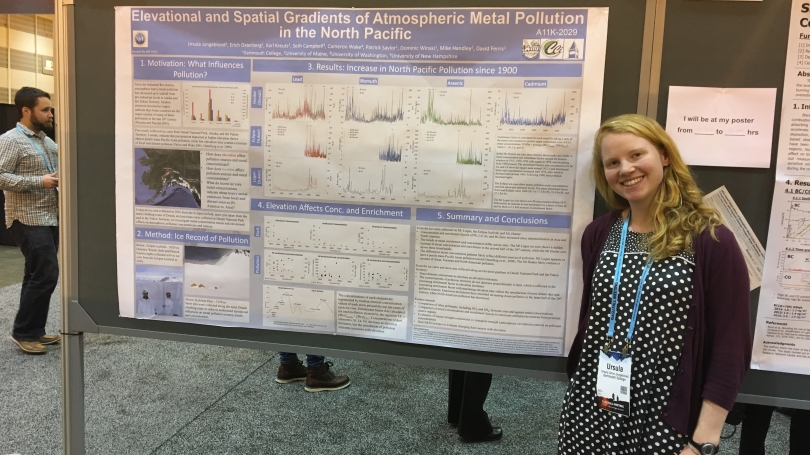
- Public Policy
- Leadership
- Funding
- News & Events
- About the Center
Back to Top Nav
Back to Top Nav
Back to Top Nav
Back to Top Nav
This December, I attended the American Geophysical Union (AGU) Fall Meeting in New Orleans, Louisiana. The AGU Fall meeting is a fantastic opportunity for undergraduate and graduate students to present their research as well as learn about the vast amount of research being performed at other institutions.
I presented the preliminary findings of my undergraduate thesis research in the form of a poster at the conference. My thesis explores how the elevation and location of where ice cores are collected affects the concentration of heavy metal pollution in the ice core samples. Ice cores can serve as an indicator for atmospheric processes, such as pollution, so the concentrations of metals in ice cores can reflect the relative amount of atmospheric metal pollution at a site.
The results seem to indicate that as elevation increases, the ice cores reflect more distant sources of pollution, while ice cores from lower elevations show a mixture of local and distant pollution. Presenting these preliminary results allowed other scientists to view the research and comment on various factors, assumptions, and possible conclusions. Several scientists viewed the results, offered possible conclusions, gave their feedback on what I had done so far, and suggested ways to move forward with the research. One researcher suggested comparing my results to a dataset of metal concentrations in lichen, which could complement the measurements of metal concentrations measured in ice cores. Scientists who were not familiar with this field of research asked questions that helped me learn how to explain the key points of my project more clearly.
Aside from presenting my research, I learned from other aspects of the conference. By attending talks and poster sessions, I learned about the scientific research done in areas such as paleoclimate, atmospheric sciences, global change, and the cryosphere. These posters taught me about specific projects done in earth science fields and illuminated details about the scientific process. Researchers were happy to share their methods for solving problems, outstanding questions they have about their research, and even advice from personal experience. As an undergraduate student, getting advice from accomplished scientists was as valuable to me as learning about projects across several fields of research. It was inspiring to see people advocate passionately about their work. Their expertise and passion made me feel excited to be participating in scientific research.
I am grateful to the Rockefeller Center for providing the funding that allowed me to attend the conference. I enjoyed speaking with scientists, presenting my thesis, and learning about research performed in other institutions from around the world.
-Submitted by Ursula Jongebloed '18, Rockefeller Center Mini Grant Recipient
The Rockefeller Center's Mini-Grants program funds registration fees for students attending conferences, as well as the costs of bringing guest speakers to Dartmouth. The views and opinions expressed here are the author’s own and do not necessarily represent the views and opinions of the Rockefeller Center or constitute an endorsement by the Center.